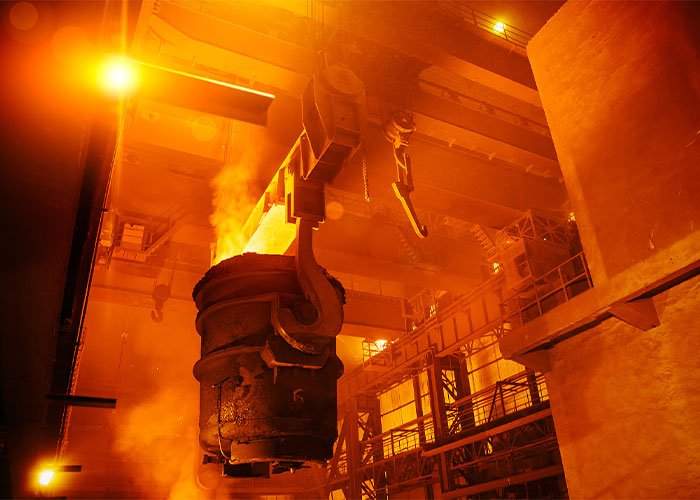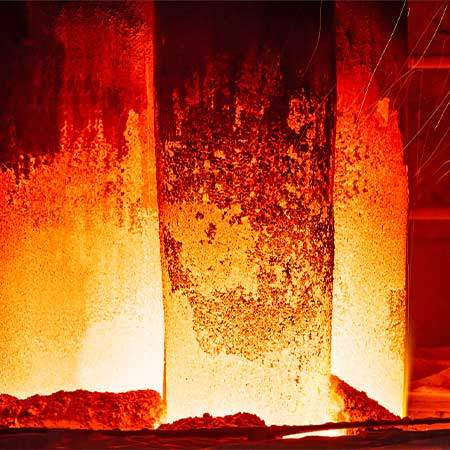Introduction
Hot rolled steel round bar is a fundamental material in the construction, manufacturing, and industrial sectors. Its unique characteristics, including high strength and durability, make it an excellent choice for applications requiring toughness and structural integrity. In this blog, we will delve deep into the properties of hot rolled steel round bar, its advantages, and the factors that influence its strength, making it a preferred material across industries.
What is Hot Rolled Steel Round Bar?

Hot rolled steel round bar refers to steel bars that have been formed by rolling steel at high temperatures, typically over 1700°F, which is above the recrystallization temperature. This process allows the steel to be shaped and formed more easily compared to cold-rolled steel. The result is a round bar with uniformity in shape, suitable for use in various applications.
The hot rolling process gives the steel a rougher surface and allows for better flexibility in sizing and shaping, making it ideal for applications where precision is not as crucial but strength is essential.
Key Properties of Hot Rolled Steel Round Bar
Strength and Durability
One of the most important characteristics of hot rolled steel round bar is its high strength. The high-temperature rolling process allows the steel to be more ductile, meaning it can withstand greater stress without breaking or deforming. This makes it suitable for load-bearing structures and other heavy-duty applications.
Toughness
Hot rolled steel round bar has excellent toughness, which means it can absorb significant amounts of energy before fracturing. This property is vital for applications that require the material to endure impacts or vibrations.
Flexibility and Workability
Unlike cold-rolled steel, hot rolled steel can be easily shaped and molded due to the high-temperature process it undergoes. This flexibility makes it easier to work with during manufacturing and construction processes.
Surface Finish
While hot rolled steel round bar typically has a rough surface finish, this can be smoothed or coated depending on the application. The rougher finish does not affect the strength of the material and can even be beneficial for certain structural applications.
Cost-Effectiveness
The hot rolling process is more cost-effective compared to cold rolling because it requires less energy and time. This makes hot rolled steel round bar a more affordable option for large-scale projects where precision is not as critical but strength is essential.
Applications of Hot Rolled Steel Round Bar
Due to its strength, toughness, and flexibility, hot rolled steel round bar is widely used in several industries. Some of the most common applications include:
- Construction: Used for reinforcing concrete structures, building frames, and columns due to its high tensile strength.
- Manufacturing: Ideal for manufacturing shafts, axles, and other heavy machinery parts that require high durability.
- Automotive Industry: Hot rolled steel round bar is used in the production of various vehicle components that must withstand extreme loads and conditions.
- Shipbuilding: Its strength and corrosion resistance make it suitable for ship components and offshore structures.
- Agricultural Equipment: Utilized in the production of heavy-duty equipment that is used in farming and agricultural settings.
Table of Mechanical Properties of Hot Rolled Steel Round Bar
The mechanical properties of hot rolled steel round bar play a crucial role in determining its suitability for different applications. Below is a table showcasing the typical mechanical properties of hot rolled steel round bar:
| Property | Hot Rolled Steel Round Bar |
|---|---|
| Tensile Strength (MPa) | 400 – 550 |
| Yield Strength (MPa) | 250 – 300 |
| Elongation (%) | 20 – 25 |
| Hardness (HB) | 120 – 180 |
| Toughness | High |
| Ductility | Excellent |
| Surface Finish | Rough, can be smoothed |
| Flexibility | High, suitable for various shaping |
Factors That Affect the Strength of Hot Rolled Steel Round Bar
While hot rolled steel round bar is known for its strength, several factors influence its mechanical properties, particularly its strength and toughness. Understanding these factors is crucial when selecting the right material for specific applications.
Composition
The chemical composition of steel has a significant impact on its strength. Hot rolled steel round bar typically contains elements like carbon, manganese, and small amounts of other alloying elements, which help enhance its strength and toughness. Higher carbon content increases the tensile strength of the steel but can reduce ductility.
Heat Treatment
Heat treatment processes, such as annealing, tempering, or quenching, can alter the microstructure of the steel and, in turn, affect its strength. For instance, quenching can harden the steel, while tempering can enhance its toughness.
Rolling Temperature
The temperature at which the steel is rolled also influences its final strength. Higher rolling temperatures result in more malleable steel with lower internal stresses, while lower temperatures can lead to higher strength but reduced workability.
Thickness and Diameter
The thickness and diameter of the hot rolled steel round bar can affect its strength. Thicker bars generally have higher strength, making them suitable for heavy-duty applications, while thinner bars may be more flexible but less strong.
Cooling Rate
The rate at which the steel cools after the hot rolling process can also impact its mechanical properties. Faster cooling rates typically result in harder steel, while slower cooling allows for better toughness.
How to Choose the Right Hot Rolled Steel Round Bar for Your Project

Choosing the right hot rolled steel round bar depends on various factors, including the requirements of your project, such as load-bearing capacity, flexibility, and environmental conditions. Below are some guidelines to help you make the right choice:
Evaluate Load Requirements
Consider the amount of stress the steel bar will need to bear. For heavy load-bearing applications, choose a hot rolled steel round bar with higher tensile and yield strength to ensure it can withstand the required forces.
Consider Environmental Factors
If the steel will be exposed to harsh environmental conditions, such as extreme temperatures or corrosive environments, you may need to select a hot rolled steel bar that has been treated or coated for additional protection.
Check for Certifications
Ensure that the hot rolled steel round bar meets industry standards and certifications, especially if it is to be used in critical applications like construction or automotive manufacturing.
Choose the Right Diameter
The diameter of the hot rolled steel round bar should be carefully selected based on the structural requirements of your project. Thicker bars provide more strength, while thinner bars may offer better flexibility for certain applications.
Conclusion
Hot rolled steel round bar is a versatile material widely used across industries for its strength, durability, and cost-effectiveness. Its ability to withstand high stress, combined with its excellent toughness, makes it an ideal choice for heavy-duty applications in construction, manufacturing, and more. By understanding the factors that affect the strength of hot rolled steel round bar, you can make informed decisions when selecting the right material for your project.
Whether you’re constructing a building or manufacturing machinery, hot rolled steel round bar provides the strength and flexibility needed to ensure long-lasting performance.
FAQ
What is hot rolled steel round bar used for?
Hot rolled steel round bar is used in various industries, including construction, manufacturing, automotive, and shipbuilding. It is often used in structural applications, shafts, gears, and machinery parts.
How is hot rolled steel round bar made?
Hot rolled steel round bar is made by rolling steel at high temperatures above its recrystallization point. This process allows the steel to be easily shaped and formed into round bars.
What are the benefits of using hot rolled steel round bar?
The benefits include high strength, durability, flexibility, and cost-effectiveness. It is also easier to work with compared to cold-rolled steel due to its ductility.
How does the rolling process affect the strength of hot rolled steel round bar?
The rolling process at high temperatures makes the steel more ductile, allowing it to retain strength while also being easier to shape. The cooling rate and composition also play a role in determining its strength.
What are the typical mechanical properties of hot rolled steel round bar?
Hot rolled steel round bar typically has a tensile strength of 400-550 MPa, a yield strength of 250-300 MPa, and excellent toughness and ductility.
Can hot rolled steel bar be used in harsh environments?
Yes, but additional treatments or coatings may be necessary to protect the steel from corrosion or extreme temperatures in harsh environments.
How does hot rolled steel round bar differ from cold rolled steel?
Hot rolled steel is processed at higher temperatures, resulting in a rougher surface and greater flexibility, while cold-rolled steel is more precise and has a smoother finish but is less ductile.
What industries commonly use hot rolled steel bar?
Industries such as construction, automotive, shipbuilding, and manufacturing commonly use hot rolled steel bar due to its strength and versatility.
Can hot rolled steel bar be machined easily?
Yes, hot rolled steel bar can be machined, though it may require additional surface treatments for precision machining, depending on the application.
How do I choose the right size of hot rolled steel bar for my project?
The size depends on the structural requirements of your project. Thicker bars are ideal for heavy-duty applications, while thinner bars may be more suitable for less demanding uses.
